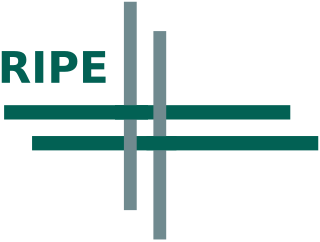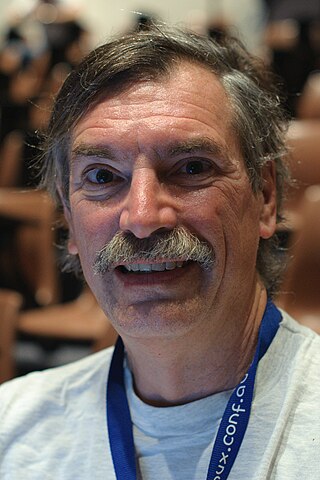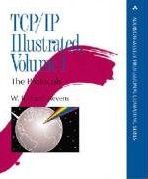
John S. Quarterman (born April 27, 1954) is an American author and longtime Internet participant. He wrote one of the classic books about networking prior to the commercialization of the Internet. He has also written about risk management.

John S. Quarterman (born April 27, 1954) is an American author and longtime Internet participant. He wrote one of the classic books about networking prior to the commercialization of the Internet. He has also written about risk management.
Quarterman grew up in the Bemiss community, near Valdosta, Georgia, US.
He first used the ARPANET in 1974 while attending Harvard, and worked on UNIX ARPANET software at BBN (the original prime contractor on the ARPANET) from 1977 to 1981. He was twice elected to the board of directors of the USENIX Association, a professional association related to the UNIX operating system. While on that board, he was instrumental in its vote in 1987 to approve the first funding received by UUNET, which, along with PSINet, became one of the first two commercial Internet Service Providers (ISPs).
He co-founded the first[ citation needed ] Internet consulting firm in Texas (TIC) in 1986, and co-founded one of the first ISPs in Austin (Zilker Internet Park, since sold to Jump Point). He was a founder of TISPA, the Texas ISP Association.
He was a founder and Chief Technology Officer of Matrix NetSystems Inc., established as Matrix Information and Directory Services (MIDS) in 1990. At Matrix, Quarterman published the first maps of the whole Internet; conducted the first Internet Demographic Survey and started the first continuing series of performance data about the entire Internet in 1993, on the web since 1995 in the Internet Weather Report, and also visible as Internet Average, plus comparisons of ISPs visible as ISP Ratings. Matrix NetSystems, which had also been known as Matrix.Net, Inc., merged with Alignment Software, Inc. in April, 2003, briefly becoming Xaffire Inc., before Keynote Systems, Inc. acquired Xaffire's Austin operations in December 2003, [1] and private equity firm Thoma Bravo merged Keynote, which it had acquired in 2013, [2] into Dynatrace. [3]
Inter@ctive Week listed John Quarterman as one of the 25 Unsung Heroes of the Internet in 1998, saying ..."As president of [MIDS], Quarterman, 43, is to Net demographics what The Gallup Organization is to opinion polls." [4] Internet World interviewed Quarterman at length with a full-page picture in its June 1996 issue, as Surveyors of Cyberspace.
On September 21, 2006, Quarterman served as a panelist with Hank Hultquist and Michele Chaboudy at a joint meeting of the IEEE Central Texas Section and Communications and Signal Processing Chapters titled "Network Neutrality: Altruism or Capitalism" at St. Edward's University in Austin, Texas. He also organized a November 2, 2006, panel on Net Neutrality for EFF-Austin, featuring Quarterman and Hank Hultquist, Michael Hathaway, and Austin Bay.

The history of the Internet has its origin in the efforts of scientists and engineers to build and interconnect computer networks. The Internet Protocol Suite, the set of rules used to communicate between networks and devices on the Internet, arose from research and development in the United States and involved international collaboration, particularly with researchers in the United Kingdom and France.
The Internet protocol suite, commonly known as TCP/IP, is a framework for organizing the set of communication protocols used in the Internet and similar computer networks according to functional criteria. The foundational protocols in the suite are the Transmission Control Protocol (TCP), the User Datagram Protocol (UDP), and the Internet Protocol (IP). Early versions of this networking model were known as the Department of Defense (DoD) model because the research and development were funded by the United States Department of Defense through DARPA.

A router is a computer and networking device that forwards data packets between computer networks, including internetworks such as the global Internet.

Réseaux IP Européens is a forum open to all parties with an interest in the technical development of the Internet. The RIPE community's objective is to ensure that the administrative and technical coordination necessary to maintain and develop the Internet continues. It is not a standards body like the Internet Engineering Task Force (IETF) and does not deal with domain names like ICANN.
The Unix file system (UFS) is a family of file systems supported by many Unix and Unix-like operating systems. It is a distant descendant of the original filesystem used by Version 7 Unix.
In computer networking, the Transport Layer Interface (TLI) was the networking API provided by AT&T UNIX System V Release 3 (SVR3) in 1987 and continued into Release 4 (SVR4). TLI was the System V counterpart to the BSD sockets programming interface, which was also provided in UNIX System V Release 4 (SVR4). TLI was later standardized as XTI, the X/Open Transport Interface.

The Computer Systems Research Group (CSRG) was a research group at the University of California, Berkeley that was dedicated to enhancing AT&T Unix operating system and funded by Defense Advanced Research Projects Agency.

Keith Bostic is an American software engineer and one of the key people in the history of Berkeley Software Distribution (BSD) Unix and open-source software.
In BSD-derived computer operating systems and in related operating systems such as SunOS, a disklabel is a record stored on a data storage device such as a hard disk that contains information about the location of the partitions on the disk. Disklabels were introduced in the 4.3BSD-Tahoe release. Disklabels are usually edited using the disklabel utility. In later versions of FreeBSD, this was renamed as bsdlabel, and finally deprecated since 15.0.

Marshall Kirk McKusick is an American computer scientist, known for his extensive work on BSD UNIX, from the 1980s to FreeBSD in the present day. He served on the board of the USENIX Association from 1986 to 1992 and again from 2000 to 2006, including terms as president from 1990 to 1992 and 2000 to 2002. He served on the editorial board of ACM Queue Magazine from 2002 to 2019. He served on the board of the FreeBSD Foundation from 2012 to 2022. He is known to friends and colleagues as "Kirk".
EUnet was a very loose collaboration of individual European UNIX sites in the 1980s that evolved into the fully commercial entity EUnet International Ltd in 1996. It was sold to Qwest in 1998. EUnet played a decisive role in the adoption of TCP/IP in Europe beginning in 1988.

The Berkeley Software Distribution or Berkeley Standard Distribution (BSD) is a discontinued operating system based on Research Unix, developed and distributed by the Computer Systems Research Group (CSRG) at the University of California, Berkeley. Since the original has become obsolete, the term "BSD" is commonly used for its open-source descendants, including FreeBSD, OpenBSD, NetBSD, and DragonFly BSD.
Samuel J Leffler is a computer scientist, known for his work on BSD, from the 1980s to FreeBSD in the present day. He created HylaFAX, LibTIFF, and the FreeBSD Wireless Device Drivers. He co-authored the Design and Implementation series of books.

TCP/IP Illustrated is the name of a series of 3 books written by W. Richard Stevens. Unlike traditional books which explain the RFC specifications, Stevens goes into great detail using actual network traces to describe the protocol, hence its 'Illustrated' title.
Keynote Systems was a U.S. based company that specialized in developing and marketing software as a service technology to measure, test, and improve from the end user perspective, the performance of websites, online content, applications, and services across browsers, networks, and mobile devices. Keynote provided independent testing, measurement and monitoring of mobile content, applications, and services on real devices across multiple mobile operator networks.
Michael J. Karels was an American software engineer and one of the key figures in history of BSD UNIX.

Michael A. Padlipsky,, known as MAP or Mike, was an early member of the working group that developed the ARPANET networking protocols that underpin today's Internet, and an internetworking polemicist.

Dynatrace, Inc. is a global technology company that provides a software observability platform based on artificial intelligence (AI) and automation. Dynatrace technologies are used to monitor, analyze, and optimize application performance, software development and security practices, IT infrastructure, and user experience for businesses and government agencies throughout the world.

NextBSD was an operating system initially based on the trunk version of FreeBSD as of August 2015. It was a fork of FreeBSD which implemented new features developed on branches, but not yet implemented in FreeBSD. As of 2019, the website is defunct, with the last commits on GitHub dating to October 2019. The Wayback Machine captures of the website after December 15, 2017 are domain squatter pages, and as of March 17, 2021, the site is redirects to a fake "Apple Support" page.
The history of the Berkeley Software Distribution began in the 1970s when University of California, Berkeley received a copy of Unix. Professors and students at the university began adding software to the operating system and released it as BSD to select universities. Since it contained proprietary Unix code, it originally had to be distributed subject to AT&T licenses. The bundled software from AT&T was then rewritten and released as free software under the BSD license. However, this resulted in a lawsuit with Unix System Laboratories, the AT&T subsidiary responsible for Unix. Eventually, in the 1990s, the final versions of BSD were publicly released without any proprietary licenses, which led to many descendants of the operating system that are still maintained today.
{{cite web}}: CS1 maint: bot: original URL status unknown (link)